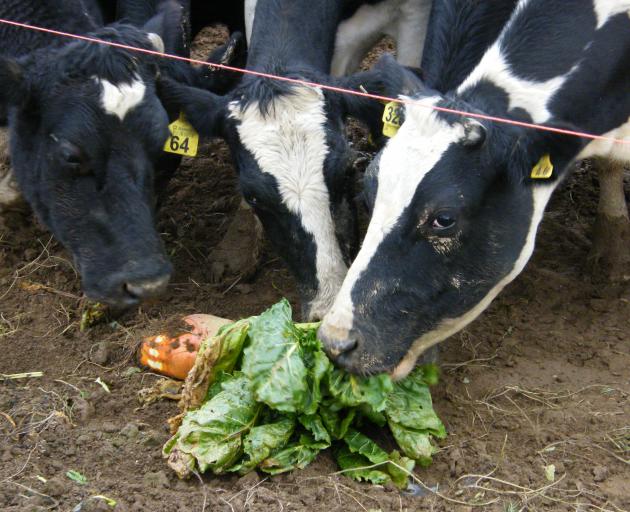
Dr Dawn Dalley, of DairyNZ, said they and their project partners, including the Southern Dairy Hub, AgResearch, and PGG Wrightson Seeds had been given $565,000 from the Ministry for Primary Industries through the Sustainable Farming Fund for the project.

She said some cows had experienced various health issues during and after feeding fodder beet, particularly in relation to the phosphorus and nitrogen content of the beet-based diet.
The project is entering the final month of year one and they plan to continue with six farmers in Otago, Canterbury and Southland in year two.
''Up to now, a lot of work on the project has been office-based, reviewing all the literature on fodder beet, surveying how farmers are using fodder beet in their system and compiling a database on fodder beet quality and mineral content,'' Dr Dalley said.
They have been using the research herds at the Southern Dairy Hub this year and want to extend their monitoring to commercial farms to provide more variability in management systems.
She said farmers needed to pay more attention to detail when growing the crop to achieve good yields, as the cost of growing it was higher than for brassicas.
''Where good yields are not being achieved, the crop may not be economically viable for them.
''If farmers had ongoing negative experiences they were looking at other options and increasingly going back to swede and kale for wintering.''
They were finalising the monitor farms and have one in Southland - in Otautau - confirmed, and two others, in Southland and Central Otago, keen to be involved.
Dr Dalley said research would look at the impact of fodder beet feeding on different classes of stock and determine viable feeding systems for each.
''We would look at the amount they should be feeding, length of time feeding, what are they feeding with, and what mineral supplements are needed.
''In the early days there were issues around transitioning cows to crop and they [farmers] had to take a lot of care with them.
''There is really good information on how to do that now, so as long as farmers follow the recommendations, this is not a big concern.''
Other feedback from farmers included concerns about metabolic issues including down cows at calving and increased milk fever.
''Fodder beet is a high quality feed, the cows love it and utilise it really well.
''Because of this, we are seeing cows with much better body condition scores (BCS) at calving. We know over-conditioned cows have a greater risk of metabolic diseases.''
The project aims to understand why some farmers are experiencing increased animal health issues when feeding fodder beet while others are not.
They will start the monitoring within the next couple of weeks.













